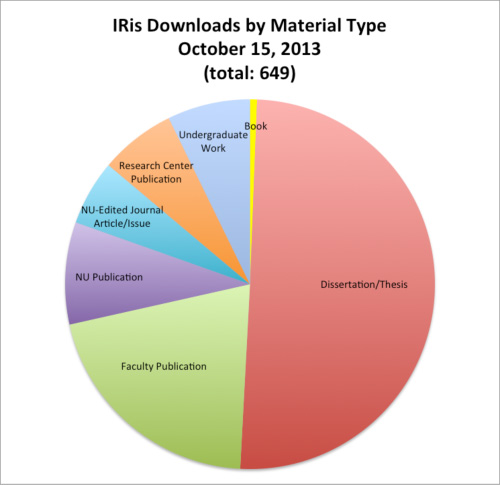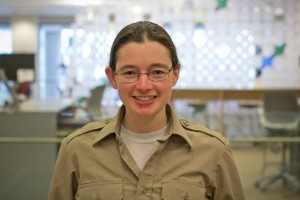When the Northeastern University Libraries launched
IRis in 2006, the idea of an “institutional repository” was still fairly new. Universities were starting repositories to share their intellectual and administrative output – faculty-authored articles, dissertations and theses, student-run publications, university-created reports, and other documents. Seven years later, many more colleges and universities around the world have digital repositories of open access materials created by their faculty, students, and staff. These repositories often also host open-access journals and other publications – at Northeastern, IRis has hosted the
Annals of Environmental Science since 2007, and also provides access to faculty-authored and -edited
books.
IRis began with only a few collections in 2006, but has grown exponentially since then. Today, IRis contains over 6,000 items, and as of Tuesday, October 15, 2013, these items have been downloaded
one million times!
Although it’s not possible to determine which one item received the lucky one-millionth download, we know that on that day, 649 items were downloaded 1147 times. Here’s a breakdown of the types of materials downloaded that day:

Here are top downloads in each category, for October 15, 2013:
- Book: Literatura judía latinoamericana contemporánea: una antología / Literatura judaica latino-americana contemporânea: uma antologia / Contemporary Jewish Latin American literature: an anthology (Stephen A. Sadow, editor, 2013)
- Dissertation/Thesis: The Evolution of Police Organizations and Leadership in the United States: Potential Political and Social Implications (Alice Elizabeth Perry, 2010)
- Faculty Publication: “The Network Structure of Exploration and Exploitation” (David Lazer & Allan Friedman, 2007)
- NU-Edited Journal Article: “Characterization of Designer Biochar Produced at Different Temperatures and Their Effects on a Loamy Sand” (Jeffrey M. Novak, et al., Annals of Environmental Science vol. 3, 2009)
- NU Publication: Using Classroom Assessment Data to Improve Student Learning (Center for Effective University Teaching, 2001)
- Research Center Publication: The Consequences of Dropping Out of High School: Joblessness and Jailing for High School Dropouts and the High Cost for Taxpayers (Center for Labor Market Studies, 2009)
- Undergraduate Work: “Design of a solar powered fruit and vegetable dryer” (Ryan Blair, et al., 2005)
As you can see, slightly more than half of the items downloaded were dissertations or master’s theses. An important contributor to the growth of IRis has been the university’s transition to an
Electronic Thesis and Dissertation (ETD) program in the 2007-2008 academic year – instead of depositing print copies of dissertations and master’s theses in the library’s archives, graduate students now submit their ETDs to ProQuest and an
open-access copy is made available through IRis. Both undergraduate and graduate research output is very popular in IRis – in fact, almost every month our most highly accessed collection is the
Honors Junior/Senior Projects!
In the coming months, we will be expanding on the success of IRis with
DRS – Northeastern University’s Digital Repository Service. The DRS will offer even more functionality for users and depositors, such as more flexible sharing options, the ability to manage permissions, and options for curated and noncurated collections.
 Are you:
…a scientist hoping to maximize the audience for your research?
…a student who’s tried to access a journal article through Google and hit a paywall?
…an early career researcher concerned about establishing your scholarly reputation?
…a taxpayer who wants to be able to access government-funded health research?
If so, then Open Access is relevant to you!
This week, Snell Library is celebrating International Open Access Week, which highlights the importance of expanding access to research on a global scale. Open Access Week is an international event now in its eighth year – its purpose is to raise awareness about inequities in access to information and promote change in the publishing industry.
Traditionally, researchers access information they need through a personal subscription, buying a book, or accessing information through a library. But what if your library doesn’t have a subscription? Or, what happens when you graduate? Or, what about researchers in developing countries where the costs of access are out of reach? (Journal subscriptions can cost thousands of dollars.) These are some of the reasons why opening access to research is important.
The theme of International Open Access Week this year is “Generation Open” – highlighting the importance of students and early career researchers as advocates for change. Snell Library has several events planned to celebrate OA Week; given the theme this year, I’m very pleased that for the first time, one of our events features a Northeastern student’s work! And be sure to stop by our table in the lobby of Snell every day this week (11:30-1:30) to learn more and pick up a totebag, laser-cut bookmark, or pen!
Schedule of Events
Monday, October 20
3:00 pm-4:30 pm
90 SL
Webcast: “Generation Open” Panel Discussion
Speakers will discuss the importance of students and early career researchers in the transition to Open Access and explore how changes in scholarly publishing affect scholars and researchers at different stages of their careers. Refreshments will be served.
Wednesday, October 22
3:30 pm-8:30 pm
Digital Scholarship Commons (211 SL)
Wikipedia Edit-a-thon
Join us to improve Wikipedia’s coverage of under-represented groups in Massachusetts and U.S. history. This hack-a-thon style session will focus on editing and updating Wikipedia pages in a group setting. Participants do not need any prior experience with Wikipedia, just bring a laptop and a power supply. Refreshments will be served.
Thursday, October 23
12:00 pm-1:00 pm
DMC 3D Printing Studio
3D Printing Presentation: Andreas Aghamianz
Northeastern student Andreas Aghamianz (COE ’18) will discuss the process of fabricating and assembling his open-sourced inMoov robotic hand.
Thursday, October 23
2:00 pm-3:00 pm
90 SL
Webcast: The Right Metrics for Generation Open
Stacy Konkiel of Impactstory presents a guide to getting credit for practicing open science. Refreshments will be served.
Are you:
…a scientist hoping to maximize the audience for your research?
…a student who’s tried to access a journal article through Google and hit a paywall?
…an early career researcher concerned about establishing your scholarly reputation?
…a taxpayer who wants to be able to access government-funded health research?
If so, then Open Access is relevant to you!
This week, Snell Library is celebrating International Open Access Week, which highlights the importance of expanding access to research on a global scale. Open Access Week is an international event now in its eighth year – its purpose is to raise awareness about inequities in access to information and promote change in the publishing industry.
Traditionally, researchers access information they need through a personal subscription, buying a book, or accessing information through a library. But what if your library doesn’t have a subscription? Or, what happens when you graduate? Or, what about researchers in developing countries where the costs of access are out of reach? (Journal subscriptions can cost thousands of dollars.) These are some of the reasons why opening access to research is important.
The theme of International Open Access Week this year is “Generation Open” – highlighting the importance of students and early career researchers as advocates for change. Snell Library has several events planned to celebrate OA Week; given the theme this year, I’m very pleased that for the first time, one of our events features a Northeastern student’s work! And be sure to stop by our table in the lobby of Snell every day this week (11:30-1:30) to learn more and pick up a totebag, laser-cut bookmark, or pen!
Schedule of Events
Monday, October 20
3:00 pm-4:30 pm
90 SL
Webcast: “Generation Open” Panel Discussion
Speakers will discuss the importance of students and early career researchers in the transition to Open Access and explore how changes in scholarly publishing affect scholars and researchers at different stages of their careers. Refreshments will be served.
Wednesday, October 22
3:30 pm-8:30 pm
Digital Scholarship Commons (211 SL)
Wikipedia Edit-a-thon
Join us to improve Wikipedia’s coverage of under-represented groups in Massachusetts and U.S. history. This hack-a-thon style session will focus on editing and updating Wikipedia pages in a group setting. Participants do not need any prior experience with Wikipedia, just bring a laptop and a power supply. Refreshments will be served.
Thursday, October 23
12:00 pm-1:00 pm
DMC 3D Printing Studio
3D Printing Presentation: Andreas Aghamianz
Northeastern student Andreas Aghamianz (COE ’18) will discuss the process of fabricating and assembling his open-sourced inMoov robotic hand.
Thursday, October 23
2:00 pm-3:00 pm
90 SL
Webcast: The Right Metrics for Generation Open
Stacy Konkiel of Impactstory presents a guide to getting credit for practicing open science. Refreshments will be served. Here are top downloads in each category, for October 15, 2013:
Here are top downloads in each category, for October 15, 2013:
